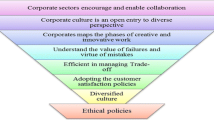Abstract
This study reviews and conceptualizes ‘Feng Shui’, which is defined as a method for inspecting and keeping in harmonious Chi. Chinese believe that positive Chi promotes fortune and health, making Feng Shui important in enabling a firm to achieve strong and good Chi. Simultaneously, this study discusses the implications of Feng Shui for the relationship between corporate reputation management and business activities. Furthermore, this study develops a practical model for understanding the process of creating corporate reputation based on Feng Shui. Finally, this study makes Feng Shui-related suggestions to Western firms operating in using Feng Shui to create a positive corporate reputation.



Similar content being viewed by others
Notes
The citation can be found from http://a.abcnews.com/Business/IndustryInfo/wireStory?id=4338532.
This study adopts the translation of Lee (1986: 17).
See Wong (2001: 23) for Feng Shui theories’ reference.
See Wong (2001: 16–18) for Feng Shui theories’ reference.
The building was finally completed and occupied in May 1990 according to company homepage of Bank of China in Hong Kong (www.bochk.com).
I thank one anonymous reviewer for pointing this insight.
References
Asiaweek (1997) ‘Nation: Hong Kong: Setting election rules: Tung wins a round for the Special Region’, 29 May.
China Times (2004) ‘Tsang, Wan-Lin, the richest people in Taiwan, had been buried in a graveyard with good Feng Shui’, 29 December, p. A14 (in Chinese).
Economist (1993) ‘Play your cards right’, 328 (7830), 76.
Forbes (2004) ‘Forbes world's richest people 2004’, Available at: http://www.forbes.com/finance/lists/10/2004/LIR.jhtml.
Glanzrock, P. (1995) ‘Banking on heritage at China trust’, Facilities Design & Management, 14 (2), 42–47.
Gray, E.R. and Balmer, J.M.T. (1998) ‘Managing corporate image and corporate reputation’, Long Range Planning, 31 (5), 695–702.
Hobson, J.S.P. (1994) ‘Feng Shui: Its impacts on the Asian hospitality industry’, International Journal of Contemporary Hospitality Management, 6 (6), 21–26.
Kono, T. (1999) ‘A strong head office makes a strong company’, Long Range Planning, 32 (2), 225–236.
Lai, C.Y.D. (1974) ‘Feng Shui model as a location index’, Annals of the Association of American Geographers, 64 (4), 506–513.
Lee, S.H. (1986) ‘Feng Shui: Its context and meaning’, Unpublished Doctoral Dissertation, Cornell University, New York.
Lip, E. (1989) Feng Shui for Business, Heian, Singapore.
Mahon, J.F. (2002) ‘Corporate reputation: A research agenda using strategy and stakeholder literature’, Business and Society, 41 (4), 415–445.
Nguyen, D. (2008) ‘Calif. McDonald's tries Feng Shui theme’, Associated Press, http://a.abcnews.com/Business/IndustryInfo/wireStory?id=4338532.
O’Connor, J.T. (1988) ‘Architecture building corporate symbols’, Harvard Business Review, 66 (5), 131–133.
Pan-Asia Human Resource Consulting Company (2004) ‘A survey of traditional beliefs in Taiwanese organizations’, Available at: http://www.9999.com.tw/pj/act/p930930_a (in Chinese).
Podel, J. (1994) ‘Bank design: As a marketing tool’, Bank Marketing, 26 (5), 10–14.
Schmitt, B.H. and Pan, Y. (1994) ‘Managing corporate and brand identities in the Asia-Pacific region’, California Management Review, 36 (Summer), 32–48.
Simmons, L.C. and Schindler, R.M. (2003) ‘Cultural superstitions and the price endings used in Chinese advertising’, Journal of International Marketing, 11 (2), 101–111.
Song, S. and Nixon, B. (2001) ‘Trends in bank architecture’, Community Banker, 10 (3), 26–31.
Tsang, W.K.E. (2004a) ‘Toward a scientific inquiry into superstitious business decision-making’, Organization Studies, 25 (6), 923–946.
Tsang, W.K.E. (2004b) ‘Superstition and decision-making: Contradiction or complement?’ Academy of Management Executive, 18 (4), 92–104.
United Daily (2004) ‘Jin Shi Yuan that faces toward Pacific Ocean has supports in the back and has treasures in the front’, 29 September, p. A5 (in Chinese).
von Boehm, G. (2000) Conversations with I.M. Pei, Prestel Publishing, Munich.
Vyse, S.A. (1997) Believing in Magic: The Psychology of Superstition, Oxford University Press, New York.
Wall Street Journal (1988) ‘China's Futuristic Bank Headquarters trips Hong Kong superstition alarms’, 9 August, p. 1 (Eastern edition).
Wall Street Journal (1989) ‘Bank of China Building, Asia's tallest, nears completion after long delays’, 14 August, p. 1 (Eastern edition).
Wong, E. (2001) A Master Course in Feng Shui, Shambhala Publications, Boston.
Xu, P. (1998) ‘Feng Shui models structured traditional Beijing courtyard house’, Journal of Architectural and Planning Research, 15 (4), 271–282.
Zetlin, M. (1995) ‘Feng Shui: Smart business or superstition?’ Management Review, 84 (8), 26–27.
Acknowledgements
The anonymous referees and Editors Cees van Riel and Charles Fombrun are appreciated for their many helpful comments, and Eric W.K. Tsang for offering useful discussion and encouragement. Henry T.H. Yen, Amy C.M Yen, Chun Wei Chao, Jui Chang Ho and Chien Fu Kuo are commended for providing consultation on Feng Shui, and Robert D. Fiala for his permission to use the photograph of the Bank of China Tower. Ted Knoy is appreciated for his editorial assistance.
Author information
Authors and Affiliations
Rights and permissions
About this article
Cite this article
Li Chang, W. Using Feng Shui to Create a Positive Corporate Reputation. Corp Reputation Rev 12, 43–51 (2009). https://doi.org/10.1057/crr.2009.2
Published:
Issue Date:
DOI: https://doi.org/10.1057/crr.2009.2




